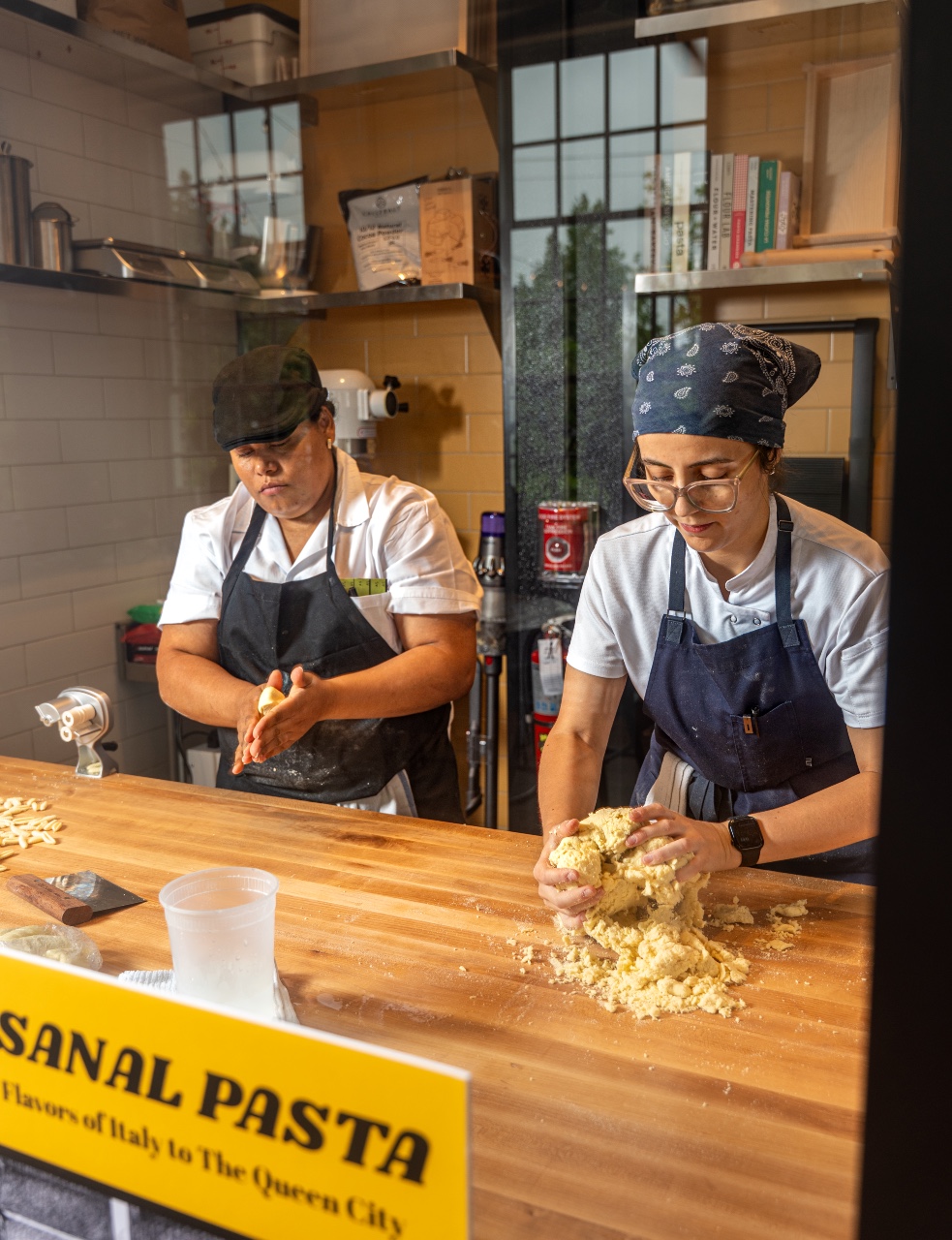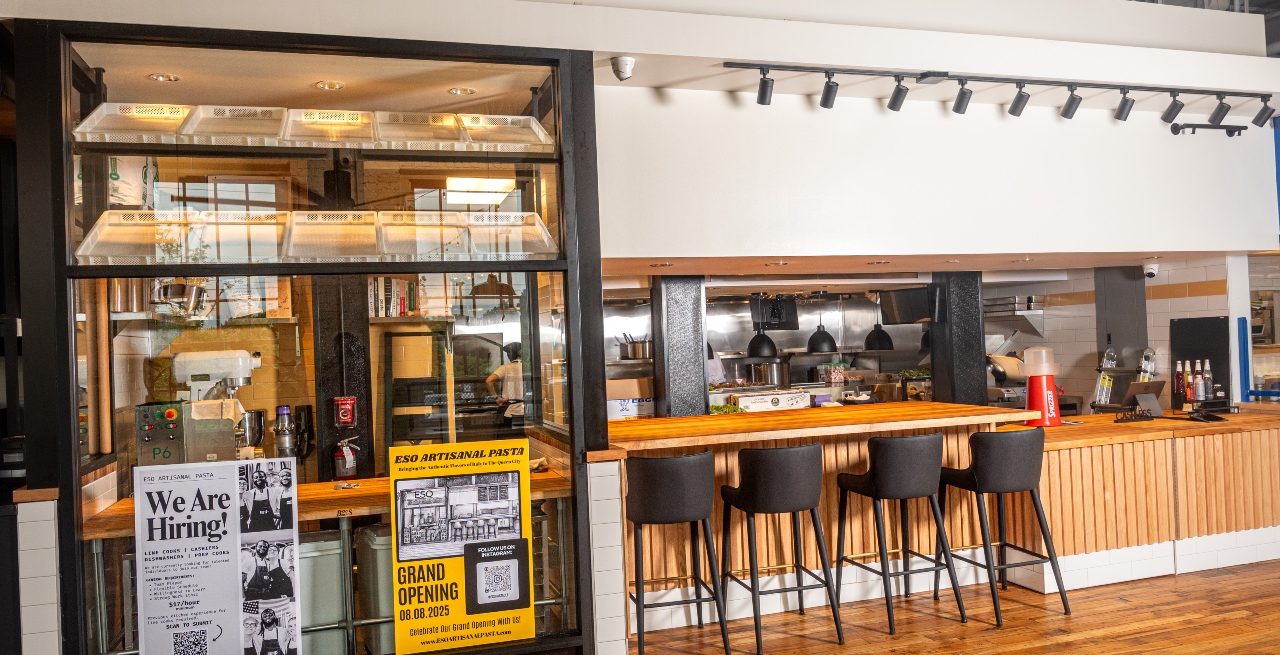From NJ to NC: The Process Behind ESO Artisanal Pasta’s Relocation to Charlotte
3 Min Read By Geri Rosman
After operating two businesses in New Jersey, AJ Sankofa and Kristina Gambarian chose to shift operations to AJ's hometown of Charlotte, North Carolina. The relocation and relaunch in August of ESO Artisanal Pasta at Optimist Hall required a two-year process of assembling a local team of design/build professionals, learning how to navigate Charlotte’s permitting process, redesigning the space to accommodate storage and weight issues, and securing international vendor relationships.
The transition from one market to another highlighted the operational, logistical, and regulatory challenges small food businesses face when entering a new city. The chef entrepreneurs outline key steps and setbacks involved in relocating their concept.

Photo by Julia Fay
Why did you decide to relocate to Charlotte after building two businesses in Morristown, NJ.?
There were a few key reasons. First and foremost, AJ’s mom lives in Charlotte, and we wanted to be closer to her and offer support. We had been visiting Charlotte every year and really loved the city; it’s vibrant, welcoming, and growing fast.
From a business standpoint, we saw Charlotte as a great opportunity to scale our concept in a market that felt less saturated than the highly competitive restaurant scene in New Jersey. We also felt there was a real opening for authentic Italian cuisine here, something done at a high level, with care and tradition. It felt like the right place and the right time to take that leap.
You signed your lease at Optimist Hall in 2023. What happened next? Why did it take two years to reach your opening?
Yes, we signed the lease in 2023, and honestly, we didn’t expect it to take two years, but relocating a business, especially as a small independent team, came with a lot of challenges.
The first phase was finding a general contractor, architect and design team. Because we were new to Charlotte and didn’t have an established network, it was a tough process. Some companies declined our project, and others had no availability. There were countless back-and-forth emails, phone calls, and trips between New Jersey and North Carolina.
Once we finally secured a general contractor and got into the build out, we ran into a significant issue: how to store 3,500 pounds of flour on a soffit. The original engineering plan didn’t work, so our team had to redesign a safe and functional solution.
During all of this, we were still operating in New Jersey doing pop-ups, private dinners and catering. So we were flying back and forth almost weekly to manage the relocation. It was a long, difficult journey, but we made it work.
Did your Morristown experience help with Charlotte’s permit process?
Definitely. Having already gone through opening a storefront in Morristown gave us a strong foundation, especially in terms of general expectations and restaurant operations. That said, the permit and inspection process in Charlotte is quite different.
Charlotte’s requirements for food stalls are unique, and the system here is much larger and more complex. We had a project manager who handled most of the communication while we were still in New Jersey. Closer to inspection time, we took the initiative to research everything on the Mecklenburg County Health Department website, which was a huge help.
There’s a lot of information out there, and while it can be overwhelming, we found it manageable, especially after recently renewing our ServSafe certifications. During inspection, the health official asked us detailed questions about our operation, so being well prepared really paid off.

What unexpected challenges did you face in Charlotte vs. Morristown? What advice would you give?
One of the biggest surprises was how difficult it was to schedule the inspections. Unlike Morristown, where everything is more centralized and moves a little faster, Charlotte is much larger and more active, with new businesses opening constantly leading to an inevitable bottleneck when trying to get inspections scheduled.
Another difference is the health inspection grading system. In New Jersey, health inspections are pass/fail. Here in Charlotte, you receive a numerical score and there is a point deduction system, which was a new experience for us.
Advice to other restaurateurs? Plan ahead as much as possible. Read the local codes, learn about the requirements, and don’t hesitate to reach out directly to the health department with questions. Being proactive and well informed makes a huge difference and can help avoid unnecessary delays.
Will ESO Artisanal Pasta remain a food stall only, or are there plans for a dine-in restaurant?
Right now, Optimist Hall offers plenty of communal seating both indoors and outdoors, so we’re not limited in terms of guest experience. But we intentionally built a Chef’s Counter overlooking the kitchen. Our long-term goal is to use that for intimate tasting menus and chef-led experiences.
Absolutely, we have plans to grow. Once ESO becomes fully established and sustainable, we’d love to open a small, farm-to-table restaurant in Charlotte. Areas like Myers Park and Dilworth really appeal to us; they have the right energy and community for what we envision.
Top photo by Dcharmedia

